The Economics Behind US Tariffs on Chinese Goods: Pros and Cons
VerifiedAdded on 2022/08/28
|8
|2020
|26
Essay
AI Summary
This essay examines the economic arguments surrounding the US's imposition of tariffs on Chinese goods, focusing on the trade war between the US and China. It begins by defining tariffs and their intended impact, which is to protect domestic producers. The essay then discusses the background of the US-China trade war, initiated in 2018, and the US's justification for imposing tariffs, including the desire to improve its economic condition and protect domestic manufacturers. The essay explores both the potential benefits, such as increased demand for domestic goods and the return of manufacturing to the US, and the drawbacks, including increased production costs for American companies, the impact on companies that rely on Chinese goods, and China's retaliatory measures. The essay concludes that while the initial 10% tariff rate might have been justifiable, the increase to 25% and the resulting trade war have negatively impacted both economies and the global economy. The analysis is supported by references to academic research and news articles, offering a detailed overview of the economic consequences of the trade dispute.
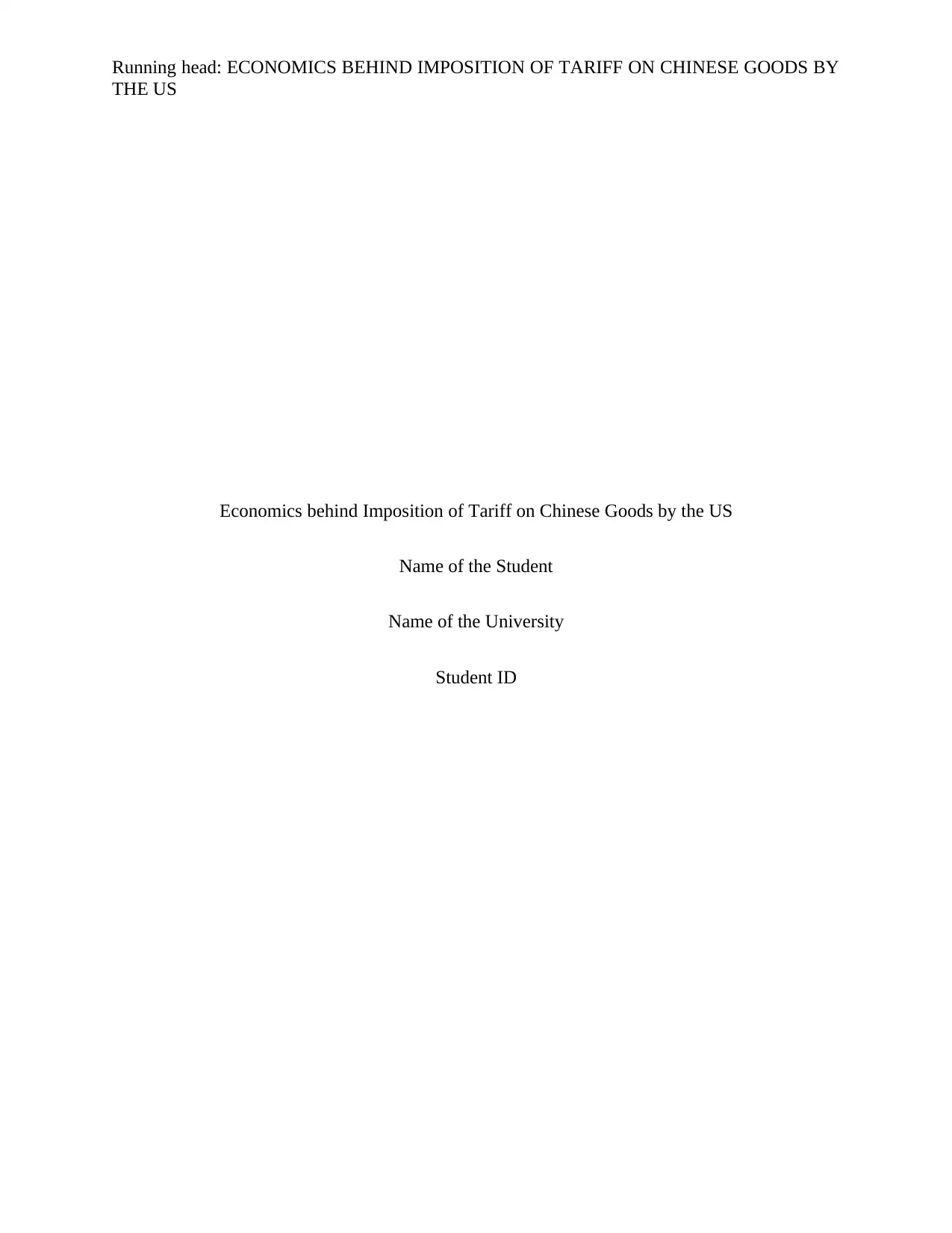
Running head: ECONOMICS BEHIND IMPOSITION OF TARIFF ON CHINESE GOODS BY
THE US
Economics behind Imposition of Tariff on Chinese Goods by the US
Name of the Student
Name of the University
Student ID
THE US
Economics behind Imposition of Tariff on Chinese Goods by the US
Name of the Student
Name of the University
Student ID
Paraphrase This Document
Need a fresh take? Get an instant paraphrase of this document with our AI Paraphraser
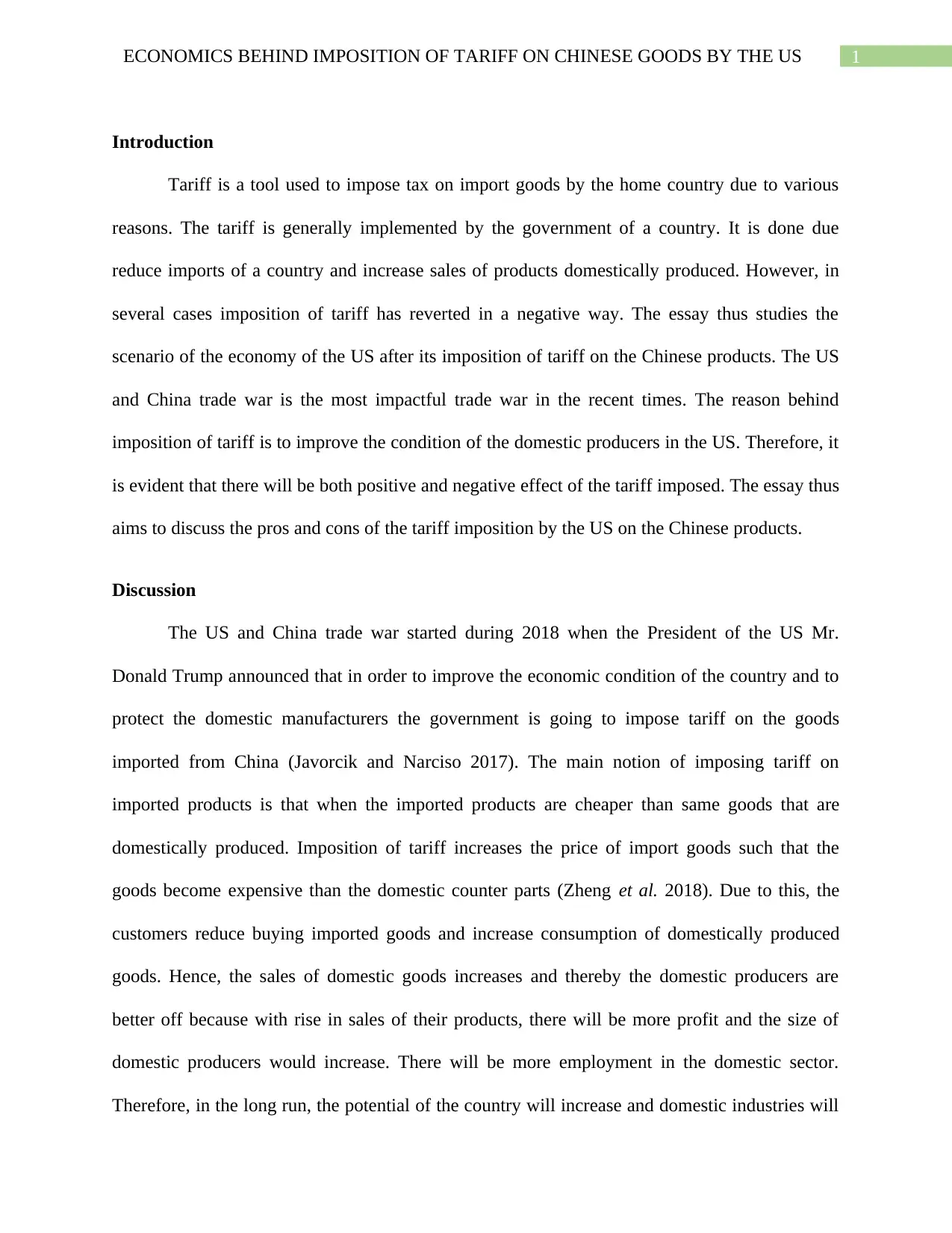
1ECONOMICS BEHIND IMPOSITION OF TARIFF ON CHINESE GOODS BY THE US
Introduction
Tariff is a tool used to impose tax on import goods by the home country due to various
reasons. The tariff is generally implemented by the government of a country. It is done due
reduce imports of a country and increase sales of products domestically produced. However, in
several cases imposition of tariff has reverted in a negative way. The essay thus studies the
scenario of the economy of the US after its imposition of tariff on the Chinese products. The US
and China trade war is the most impactful trade war in the recent times. The reason behind
imposition of tariff is to improve the condition of the domestic producers in the US. Therefore, it
is evident that there will be both positive and negative effect of the tariff imposed. The essay thus
aims to discuss the pros and cons of the tariff imposition by the US on the Chinese products.
Discussion
The US and China trade war started during 2018 when the President of the US Mr.
Donald Trump announced that in order to improve the economic condition of the country and to
protect the domestic manufacturers the government is going to impose tariff on the goods
imported from China (Javorcik and Narciso 2017). The main notion of imposing tariff on
imported products is that when the imported products are cheaper than same goods that are
domestically produced. Imposition of tariff increases the price of import goods such that the
goods become expensive than the domestic counter parts (Zheng et al. 2018). Due to this, the
customers reduce buying imported goods and increase consumption of domestically produced
goods. Hence, the sales of domestic goods increases and thereby the domestic producers are
better off because with rise in sales of their products, there will be more profit and the size of
domestic producers would increase. There will be more employment in the domestic sector.
Therefore, in the long run, the potential of the country will increase and domestic industries will
Introduction
Tariff is a tool used to impose tax on import goods by the home country due to various
reasons. The tariff is generally implemented by the government of a country. It is done due
reduce imports of a country and increase sales of products domestically produced. However, in
several cases imposition of tariff has reverted in a negative way. The essay thus studies the
scenario of the economy of the US after its imposition of tariff on the Chinese products. The US
and China trade war is the most impactful trade war in the recent times. The reason behind
imposition of tariff is to improve the condition of the domestic producers in the US. Therefore, it
is evident that there will be both positive and negative effect of the tariff imposed. The essay thus
aims to discuss the pros and cons of the tariff imposition by the US on the Chinese products.
Discussion
The US and China trade war started during 2018 when the President of the US Mr.
Donald Trump announced that in order to improve the economic condition of the country and to
protect the domestic manufacturers the government is going to impose tariff on the goods
imported from China (Javorcik and Narciso 2017). The main notion of imposing tariff on
imported products is that when the imported products are cheaper than same goods that are
domestically produced. Imposition of tariff increases the price of import goods such that the
goods become expensive than the domestic counter parts (Zheng et al. 2018). Due to this, the
customers reduce buying imported goods and increase consumption of domestically produced
goods. Hence, the sales of domestic goods increases and thereby the domestic producers are
better off because with rise in sales of their products, there will be more profit and the size of
domestic producers would increase. There will be more employment in the domestic sector.
Therefore, in the long run, the potential of the country will increase and domestic industries will
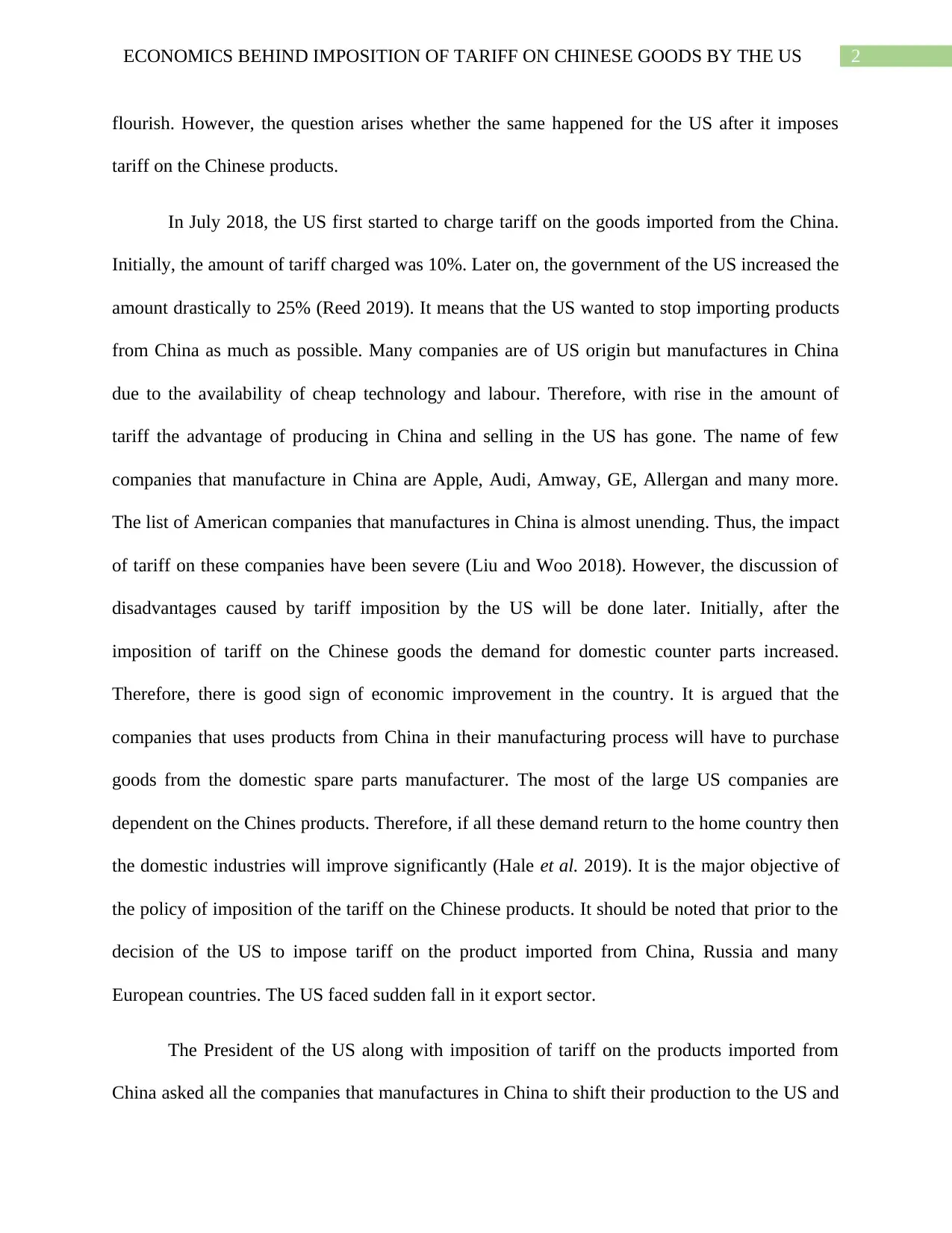
2ECONOMICS BEHIND IMPOSITION OF TARIFF ON CHINESE GOODS BY THE US
flourish. However, the question arises whether the same happened for the US after it imposes
tariff on the Chinese products.
In July 2018, the US first started to charge tariff on the goods imported from the China.
Initially, the amount of tariff charged was 10%. Later on, the government of the US increased the
amount drastically to 25% (Reed 2019). It means that the US wanted to stop importing products
from China as much as possible. Many companies are of US origin but manufactures in China
due to the availability of cheap technology and labour. Therefore, with rise in the amount of
tariff the advantage of producing in China and selling in the US has gone. The name of few
companies that manufacture in China are Apple, Audi, Amway, GE, Allergan and many more.
The list of American companies that manufactures in China is almost unending. Thus, the impact
of tariff on these companies have been severe (Liu and Woo 2018). However, the discussion of
disadvantages caused by tariff imposition by the US will be done later. Initially, after the
imposition of tariff on the Chinese goods the demand for domestic counter parts increased.
Therefore, there is good sign of economic improvement in the country. It is argued that the
companies that uses products from China in their manufacturing process will have to purchase
goods from the domestic spare parts manufacturer. The most of the large US companies are
dependent on the Chines products. Therefore, if all these demand return to the home country then
the domestic industries will improve significantly (Hale et al. 2019). It is the major objective of
the policy of imposition of the tariff on the Chinese products. It should be noted that prior to the
decision of the US to impose tariff on the product imported from China, Russia and many
European countries. The US faced sudden fall in it export sector.
The President of the US along with imposition of tariff on the products imported from
China asked all the companies that manufactures in China to shift their production to the US and
flourish. However, the question arises whether the same happened for the US after it imposes
tariff on the Chinese products.
In July 2018, the US first started to charge tariff on the goods imported from the China.
Initially, the amount of tariff charged was 10%. Later on, the government of the US increased the
amount drastically to 25% (Reed 2019). It means that the US wanted to stop importing products
from China as much as possible. Many companies are of US origin but manufactures in China
due to the availability of cheap technology and labour. Therefore, with rise in the amount of
tariff the advantage of producing in China and selling in the US has gone. The name of few
companies that manufacture in China are Apple, Audi, Amway, GE, Allergan and many more.
The list of American companies that manufactures in China is almost unending. Thus, the impact
of tariff on these companies have been severe (Liu and Woo 2018). However, the discussion of
disadvantages caused by tariff imposition by the US will be done later. Initially, after the
imposition of tariff on the Chinese goods the demand for domestic counter parts increased.
Therefore, there is good sign of economic improvement in the country. It is argued that the
companies that uses products from China in their manufacturing process will have to purchase
goods from the domestic spare parts manufacturer. The most of the large US companies are
dependent on the Chines products. Therefore, if all these demand return to the home country then
the domestic industries will improve significantly (Hale et al. 2019). It is the major objective of
the policy of imposition of the tariff on the Chinese products. It should be noted that prior to the
decision of the US to impose tariff on the product imported from China, Russia and many
European countries. The US faced sudden fall in it export sector.
The President of the US along with imposition of tariff on the products imported from
China asked all the companies that manufactures in China to shift their production to the US and
⊘ This is a preview!⊘
Do you want full access?
Subscribe today to unlock all pages.

Trusted by 1+ million students worldwide
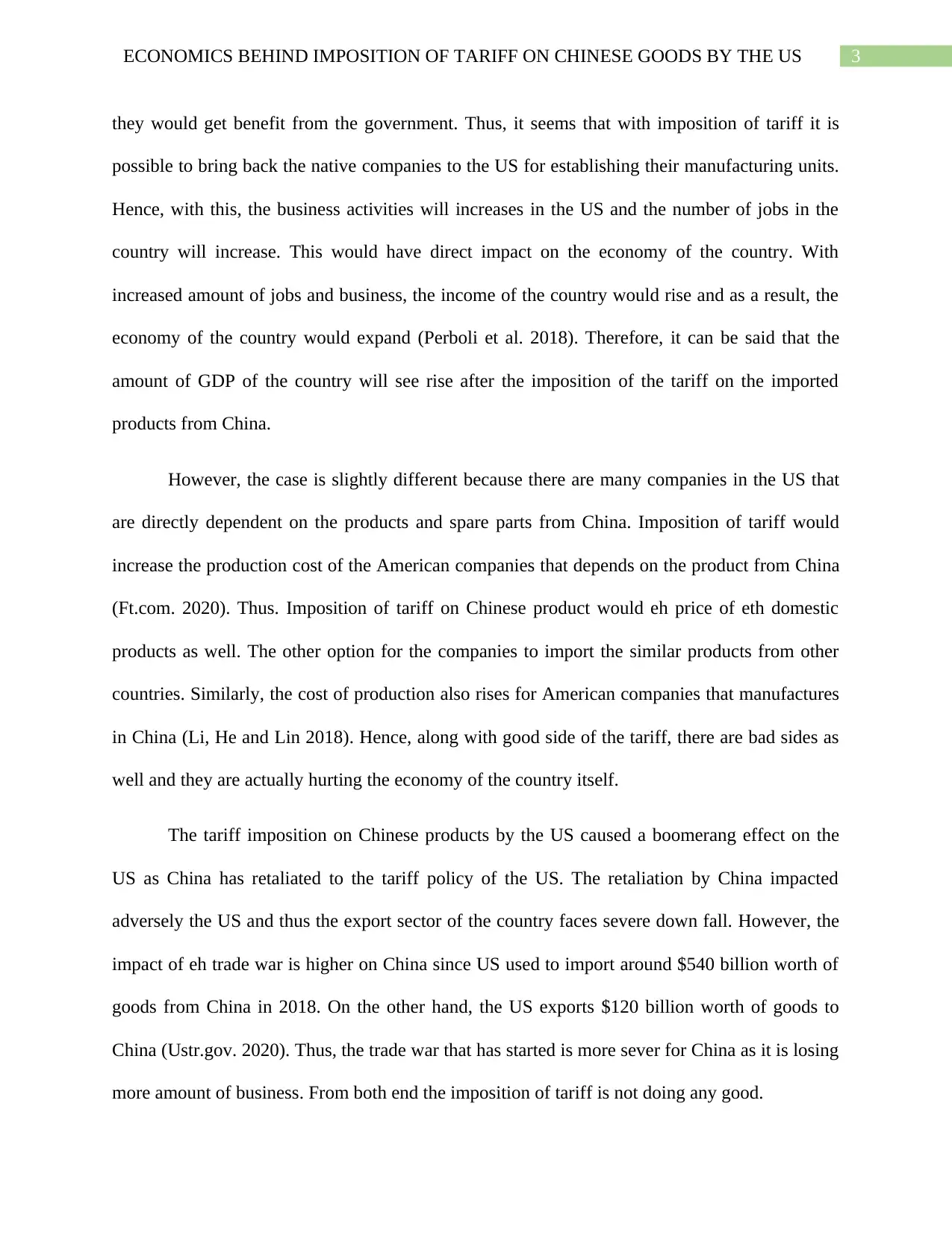
3ECONOMICS BEHIND IMPOSITION OF TARIFF ON CHINESE GOODS BY THE US
they would get benefit from the government. Thus, it seems that with imposition of tariff it is
possible to bring back the native companies to the US for establishing their manufacturing units.
Hence, with this, the business activities will increases in the US and the number of jobs in the
country will increase. This would have direct impact on the economy of the country. With
increased amount of jobs and business, the income of the country would rise and as a result, the
economy of the country would expand (Perboli et al. 2018). Therefore, it can be said that the
amount of GDP of the country will see rise after the imposition of the tariff on the imported
products from China.
However, the case is slightly different because there are many companies in the US that
are directly dependent on the products and spare parts from China. Imposition of tariff would
increase the production cost of the American companies that depends on the product from China
(Ft.com. 2020). Thus. Imposition of tariff on Chinese product would eh price of eth domestic
products as well. The other option for the companies to import the similar products from other
countries. Similarly, the cost of production also rises for American companies that manufactures
in China (Li, He and Lin 2018). Hence, along with good side of the tariff, there are bad sides as
well and they are actually hurting the economy of the country itself.
The tariff imposition on Chinese products by the US caused a boomerang effect on the
US as China has retaliated to the tariff policy of the US. The retaliation by China impacted
adversely the US and thus the export sector of the country faces severe down fall. However, the
impact of eh trade war is higher on China since US used to import around $540 billion worth of
goods from China in 2018. On the other hand, the US exports $120 billion worth of goods to
China (Ustr.gov. 2020). Thus, the trade war that has started is more sever for China as it is losing
more amount of business. From both end the imposition of tariff is not doing any good.
they would get benefit from the government. Thus, it seems that with imposition of tariff it is
possible to bring back the native companies to the US for establishing their manufacturing units.
Hence, with this, the business activities will increases in the US and the number of jobs in the
country will increase. This would have direct impact on the economy of the country. With
increased amount of jobs and business, the income of the country would rise and as a result, the
economy of the country would expand (Perboli et al. 2018). Therefore, it can be said that the
amount of GDP of the country will see rise after the imposition of the tariff on the imported
products from China.
However, the case is slightly different because there are many companies in the US that
are directly dependent on the products and spare parts from China. Imposition of tariff would
increase the production cost of the American companies that depends on the product from China
(Ft.com. 2020). Thus. Imposition of tariff on Chinese product would eh price of eth domestic
products as well. The other option for the companies to import the similar products from other
countries. Similarly, the cost of production also rises for American companies that manufactures
in China (Li, He and Lin 2018). Hence, along with good side of the tariff, there are bad sides as
well and they are actually hurting the economy of the country itself.
The tariff imposition on Chinese products by the US caused a boomerang effect on the
US as China has retaliated to the tariff policy of the US. The retaliation by China impacted
adversely the US and thus the export sector of the country faces severe down fall. However, the
impact of eh trade war is higher on China since US used to import around $540 billion worth of
goods from China in 2018. On the other hand, the US exports $120 billion worth of goods to
China (Ustr.gov. 2020). Thus, the trade war that has started is more sever for China as it is losing
more amount of business. From both end the imposition of tariff is not doing any good.
Paraphrase This Document
Need a fresh take? Get an instant paraphrase of this document with our AI Paraphraser
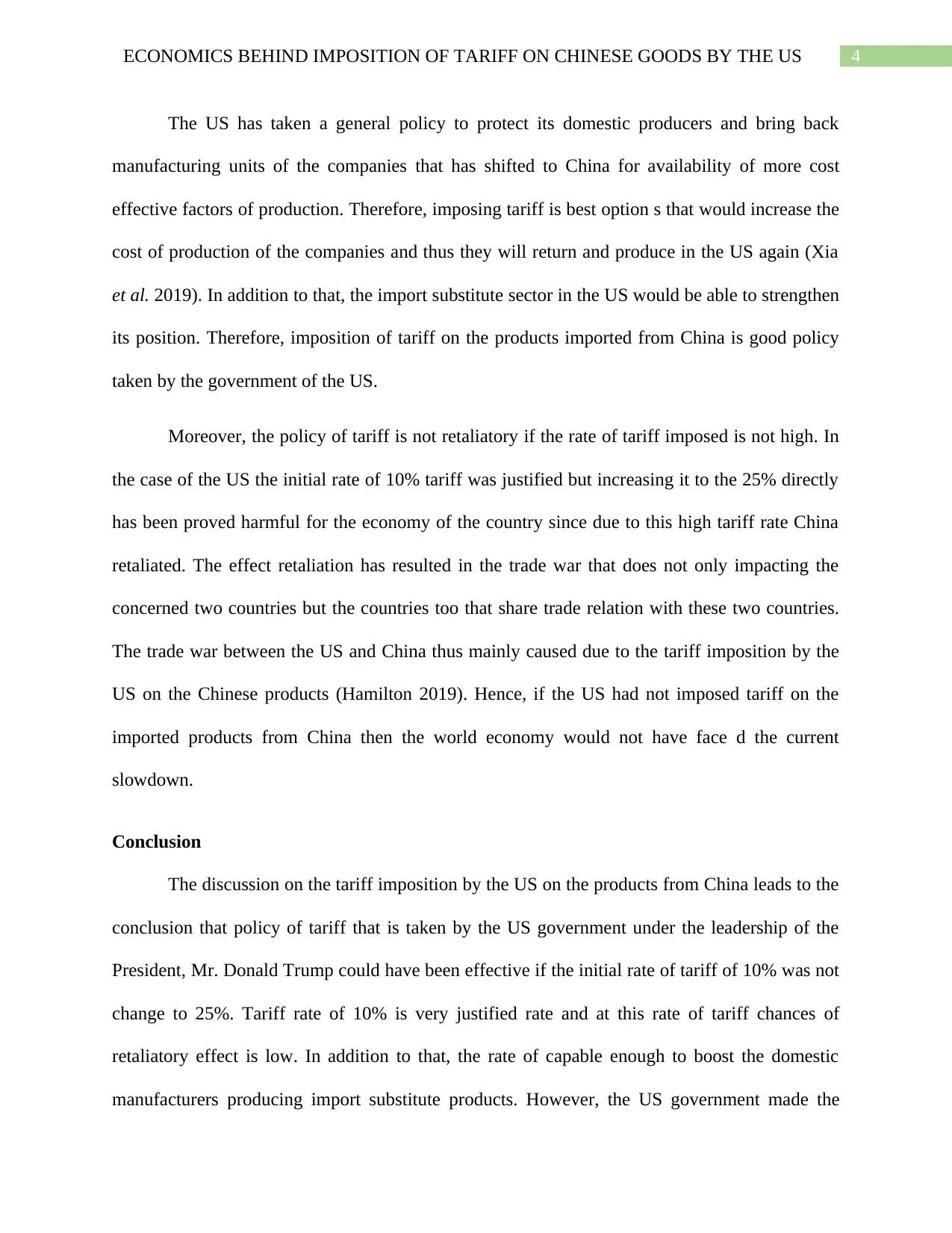
4ECONOMICS BEHIND IMPOSITION OF TARIFF ON CHINESE GOODS BY THE US
The US has taken a general policy to protect its domestic producers and bring back
manufacturing units of the companies that has shifted to China for availability of more cost
effective factors of production. Therefore, imposing tariff is best option s that would increase the
cost of production of the companies and thus they will return and produce in the US again (Xia
et al. 2019). In addition to that, the import substitute sector in the US would be able to strengthen
its position. Therefore, imposition of tariff on the products imported from China is good policy
taken by the government of the US.
Moreover, the policy of tariff is not retaliatory if the rate of tariff imposed is not high. In
the case of the US the initial rate of 10% tariff was justified but increasing it to the 25% directly
has been proved harmful for the economy of the country since due to this high tariff rate China
retaliated. The effect retaliation has resulted in the trade war that does not only impacting the
concerned two countries but the countries too that share trade relation with these two countries.
The trade war between the US and China thus mainly caused due to the tariff imposition by the
US on the Chinese products (Hamilton 2019). Hence, if the US had not imposed tariff on the
imported products from China then the world economy would not have face d the current
slowdown.
Conclusion
The discussion on the tariff imposition by the US on the products from China leads to the
conclusion that policy of tariff that is taken by the US government under the leadership of the
President, Mr. Donald Trump could have been effective if the initial rate of tariff of 10% was not
change to 25%. Tariff rate of 10% is very justified rate and at this rate of tariff chances of
retaliatory effect is low. In addition to that, the rate of capable enough to boost the domestic
manufacturers producing import substitute products. However, the US government made the
The US has taken a general policy to protect its domestic producers and bring back
manufacturing units of the companies that has shifted to China for availability of more cost
effective factors of production. Therefore, imposing tariff is best option s that would increase the
cost of production of the companies and thus they will return and produce in the US again (Xia
et al. 2019). In addition to that, the import substitute sector in the US would be able to strengthen
its position. Therefore, imposition of tariff on the products imported from China is good policy
taken by the government of the US.
Moreover, the policy of tariff is not retaliatory if the rate of tariff imposed is not high. In
the case of the US the initial rate of 10% tariff was justified but increasing it to the 25% directly
has been proved harmful for the economy of the country since due to this high tariff rate China
retaliated. The effect retaliation has resulted in the trade war that does not only impacting the
concerned two countries but the countries too that share trade relation with these two countries.
The trade war between the US and China thus mainly caused due to the tariff imposition by the
US on the Chinese products (Hamilton 2019). Hence, if the US had not imposed tariff on the
imported products from China then the world economy would not have face d the current
slowdown.
Conclusion
The discussion on the tariff imposition by the US on the products from China leads to the
conclusion that policy of tariff that is taken by the US government under the leadership of the
President, Mr. Donald Trump could have been effective if the initial rate of tariff of 10% was not
change to 25%. Tariff rate of 10% is very justified rate and at this rate of tariff chances of
retaliatory effect is low. In addition to that, the rate of capable enough to boost the domestic
manufacturers producing import substitute products. However, the US government made the
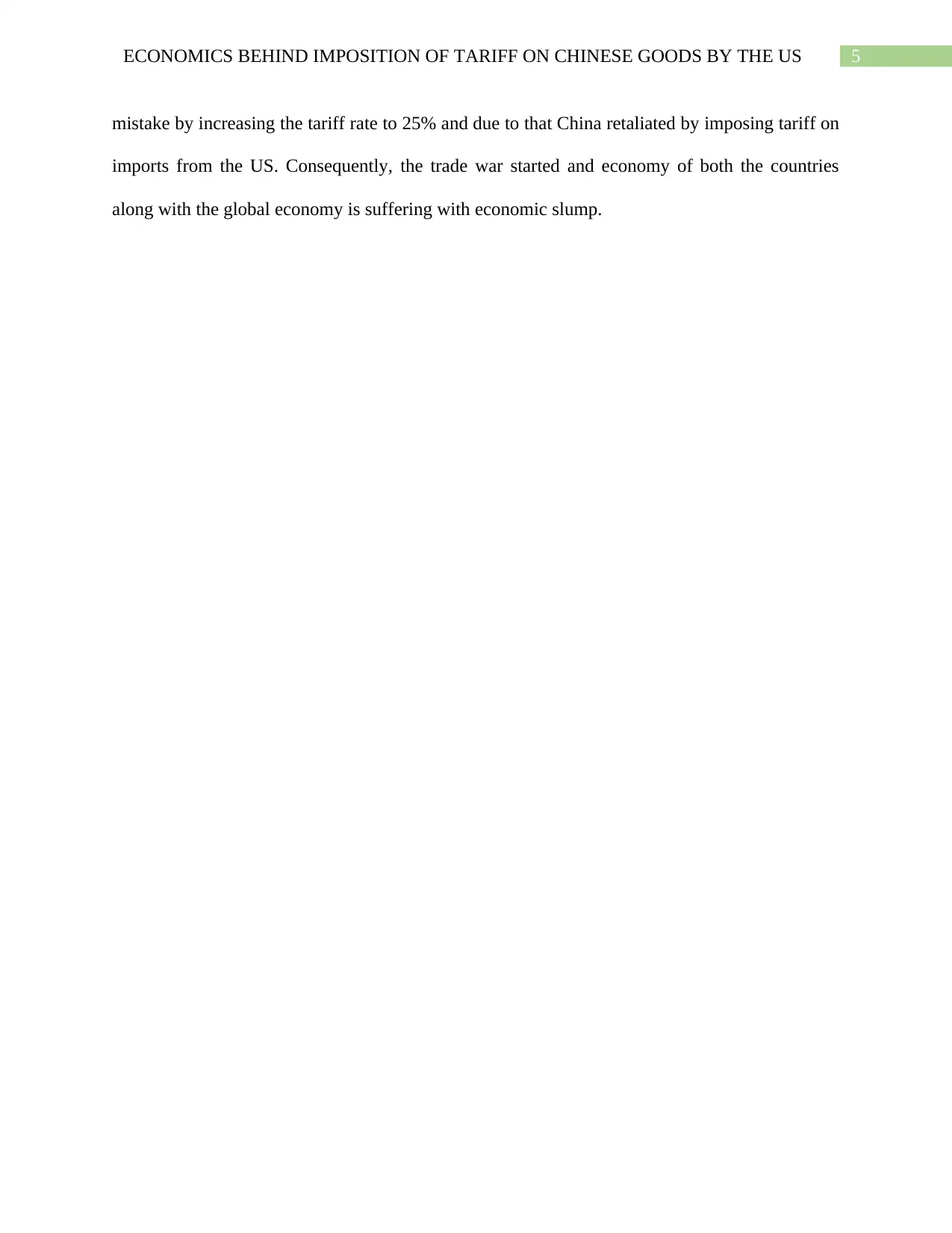
5ECONOMICS BEHIND IMPOSITION OF TARIFF ON CHINESE GOODS BY THE US
mistake by increasing the tariff rate to 25% and due to that China retaliated by imposing tariff on
imports from the US. Consequently, the trade war started and economy of both the countries
along with the global economy is suffering with economic slump.
mistake by increasing the tariff rate to 25% and due to that China retaliated by imposing tariff on
imports from the US. Consequently, the trade war started and economy of both the countries
along with the global economy is suffering with economic slump.
⊘ This is a preview!⊘
Do you want full access?
Subscribe today to unlock all pages.

Trusted by 1+ million students worldwide
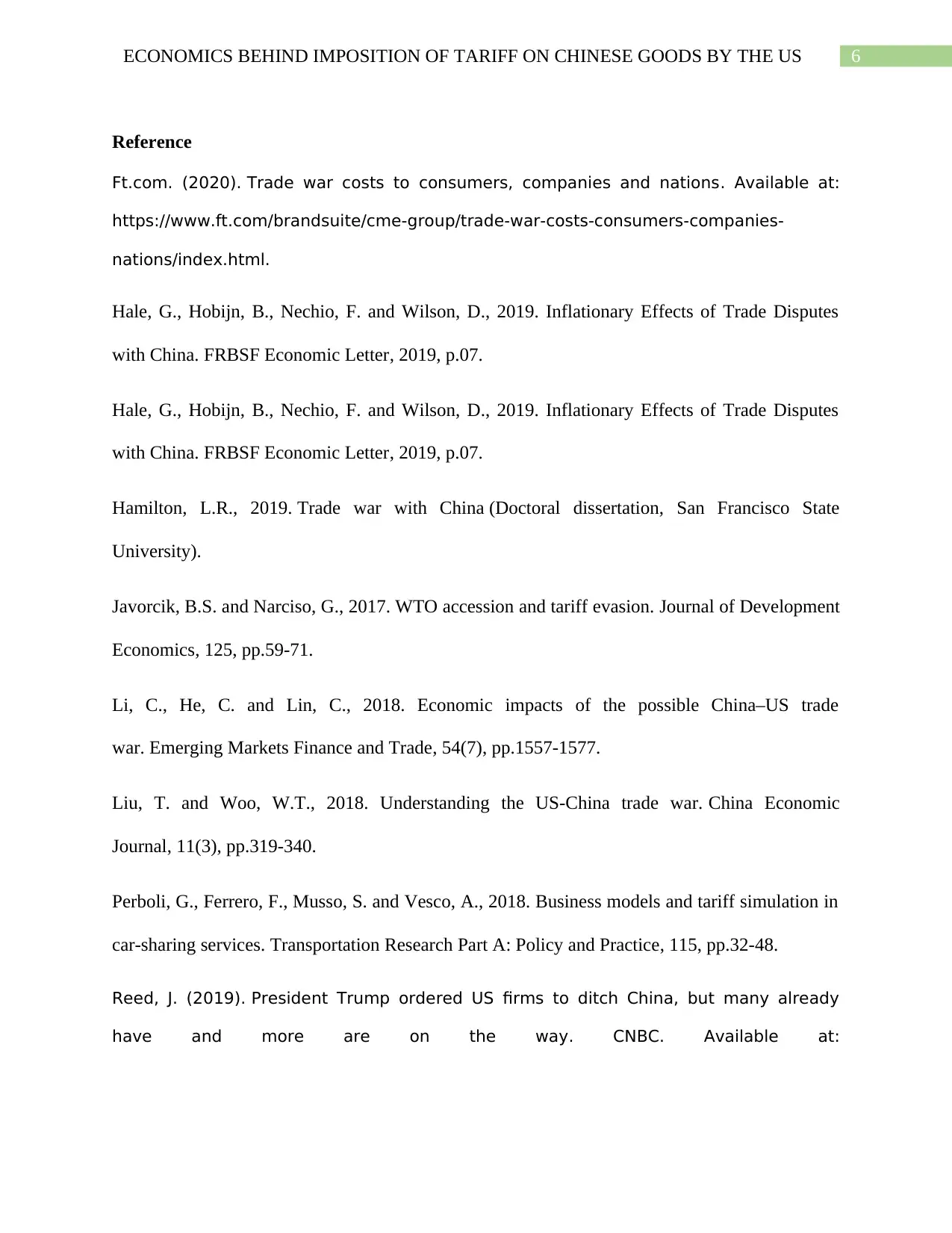
6ECONOMICS BEHIND IMPOSITION OF TARIFF ON CHINESE GOODS BY THE US
Reference
Ft.com. (2020). Trade war costs to consumers, companies and nations. Available at:
https://www.ft.com/brandsuite/cme-group/trade-war-costs-consumers-companies-
nations/index.html.
Hale, G., Hobijn, B., Nechio, F. and Wilson, D., 2019. Inflationary Effects of Trade Disputes
with China. FRBSF Economic Letter, 2019, p.07.
Hale, G., Hobijn, B., Nechio, F. and Wilson, D., 2019. Inflationary Effects of Trade Disputes
with China. FRBSF Economic Letter, 2019, p.07.
Hamilton, L.R., 2019. Trade war with China (Doctoral dissertation, San Francisco State
University).
Javorcik, B.S. and Narciso, G., 2017. WTO accession and tariff evasion. Journal of Development
Economics, 125, pp.59-71.
Li, C., He, C. and Lin, C., 2018. Economic impacts of the possible China–US trade
war. Emerging Markets Finance and Trade, 54(7), pp.1557-1577.
Liu, T. and Woo, W.T., 2018. Understanding the US-China trade war. China Economic
Journal, 11(3), pp.319-340.
Perboli, G., Ferrero, F., Musso, S. and Vesco, A., 2018. Business models and tariff simulation in
car-sharing services. Transportation Research Part A: Policy and Practice, 115, pp.32-48.
Reed, J. (2019). President Trump ordered US firms to ditch China, but many already
have and more are on the way. CNBC. Available at:
Reference
Ft.com. (2020). Trade war costs to consumers, companies and nations. Available at:
https://www.ft.com/brandsuite/cme-group/trade-war-costs-consumers-companies-
nations/index.html.
Hale, G., Hobijn, B., Nechio, F. and Wilson, D., 2019. Inflationary Effects of Trade Disputes
with China. FRBSF Economic Letter, 2019, p.07.
Hale, G., Hobijn, B., Nechio, F. and Wilson, D., 2019. Inflationary Effects of Trade Disputes
with China. FRBSF Economic Letter, 2019, p.07.
Hamilton, L.R., 2019. Trade war with China (Doctoral dissertation, San Francisco State
University).
Javorcik, B.S. and Narciso, G., 2017. WTO accession and tariff evasion. Journal of Development
Economics, 125, pp.59-71.
Li, C., He, C. and Lin, C., 2018. Economic impacts of the possible China–US trade
war. Emerging Markets Finance and Trade, 54(7), pp.1557-1577.
Liu, T. and Woo, W.T., 2018. Understanding the US-China trade war. China Economic
Journal, 11(3), pp.319-340.
Perboli, G., Ferrero, F., Musso, S. and Vesco, A., 2018. Business models and tariff simulation in
car-sharing services. Transportation Research Part A: Policy and Practice, 115, pp.32-48.
Reed, J. (2019). President Trump ordered US firms to ditch China, but many already
have and more are on the way. CNBC. Available at:
Paraphrase This Document
Need a fresh take? Get an instant paraphrase of this document with our AI Paraphraser
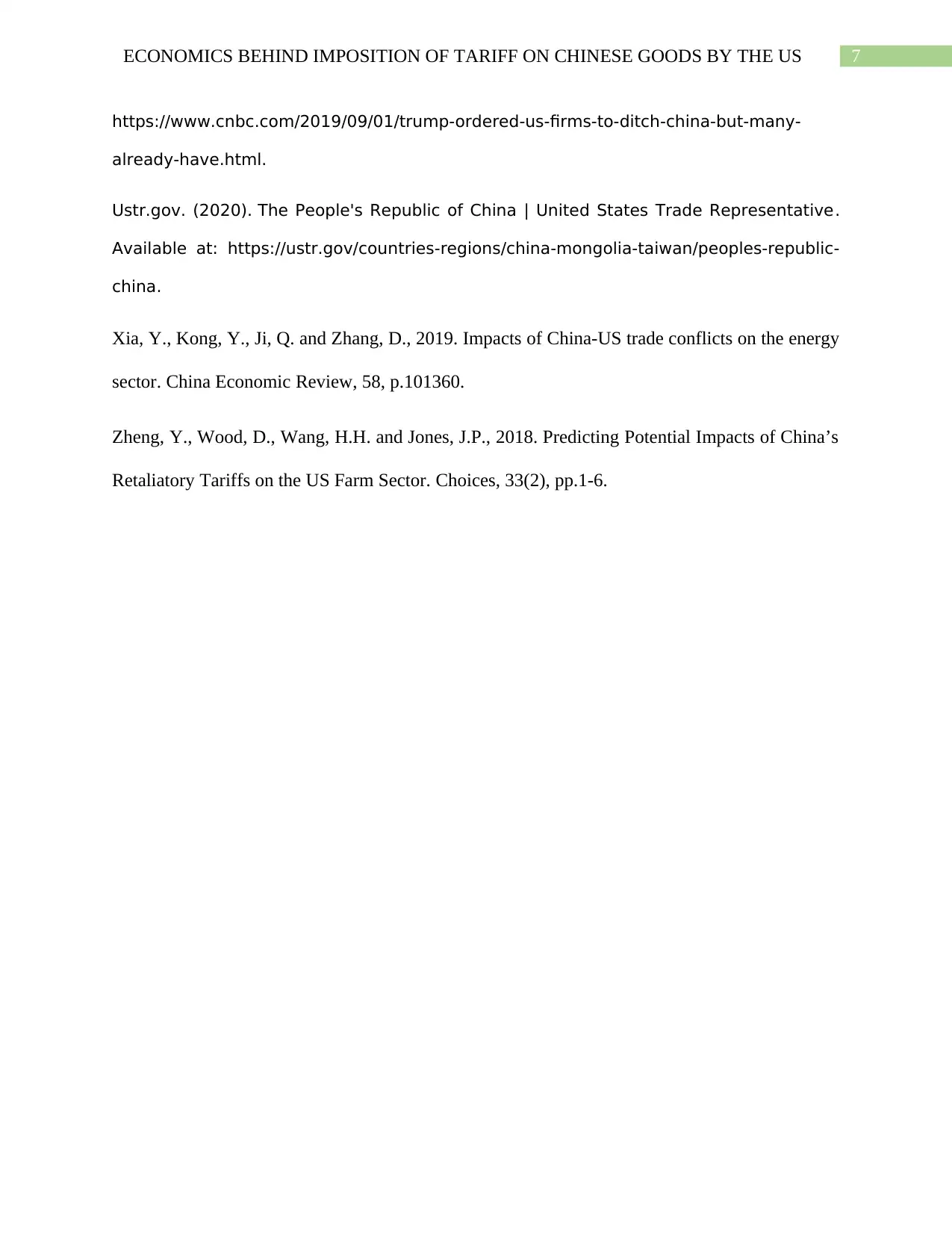
7ECONOMICS BEHIND IMPOSITION OF TARIFF ON CHINESE GOODS BY THE US
https://www.cnbc.com/2019/09/01/trump-ordered-us-firms-to-ditch-china-but-many-
already-have.html.
Ustr.gov. (2020). The People's Republic of China | United States Trade Representative.
Available at: https://ustr.gov/countries-regions/china-mongolia-taiwan/peoples-republic-
china.
Xia, Y., Kong, Y., Ji, Q. and Zhang, D., 2019. Impacts of China-US trade conflicts on the energy
sector. China Economic Review, 58, p.101360.
Zheng, Y., Wood, D., Wang, H.H. and Jones, J.P., 2018. Predicting Potential Impacts of China’s
Retaliatory Tariffs on the US Farm Sector. Choices, 33(2), pp.1-6.
https://www.cnbc.com/2019/09/01/trump-ordered-us-firms-to-ditch-china-but-many-
already-have.html.
Ustr.gov. (2020). The People's Republic of China | United States Trade Representative.
Available at: https://ustr.gov/countries-regions/china-mongolia-taiwan/peoples-republic-
china.
Xia, Y., Kong, Y., Ji, Q. and Zhang, D., 2019. Impacts of China-US trade conflicts on the energy
sector. China Economic Review, 58, p.101360.
Zheng, Y., Wood, D., Wang, H.H. and Jones, J.P., 2018. Predicting Potential Impacts of China’s
Retaliatory Tariffs on the US Farm Sector. Choices, 33(2), pp.1-6.
1 out of 8
Related Documents
Your All-in-One AI-Powered Toolkit for Academic Success.
+13062052269
info@desklib.com
Available 24*7 on WhatsApp / Email
![[object Object]](/_next/static/media/star-bottom.7253800d.svg)
Unlock your academic potential
Copyright © 2020–2026 A2Z Services. All Rights Reserved. Developed and managed by ZUCOL.





